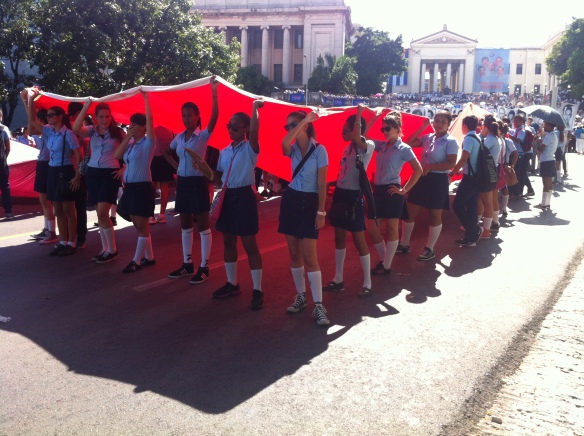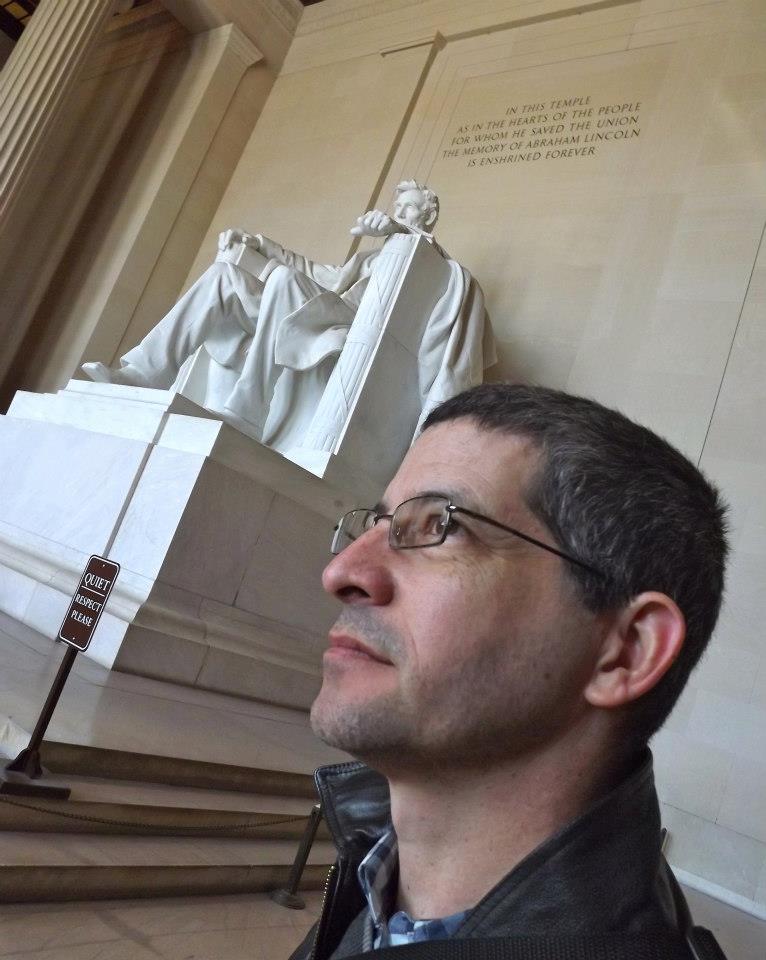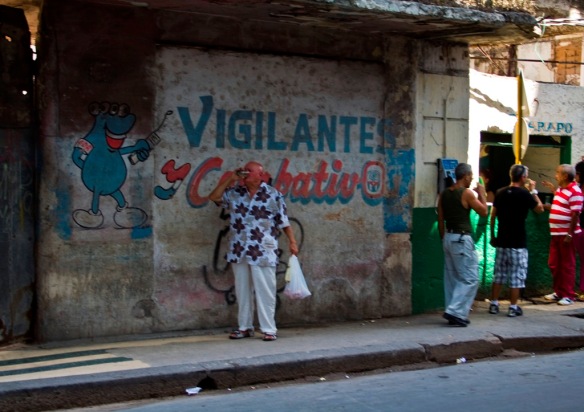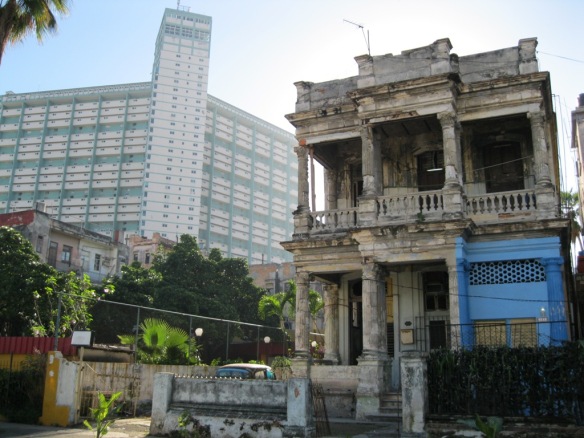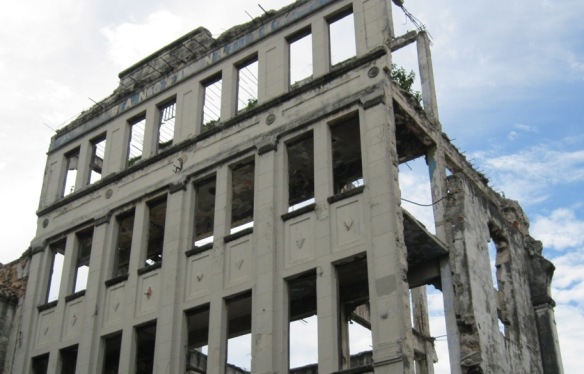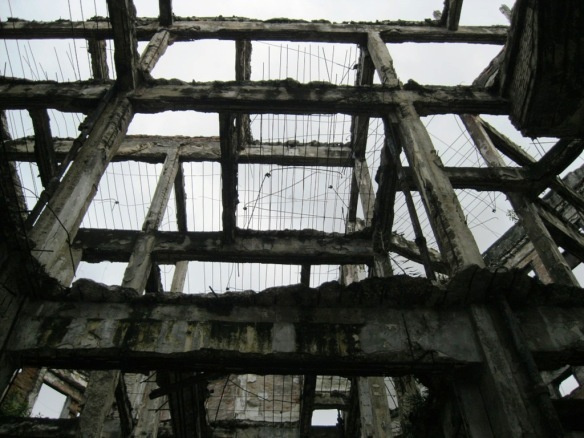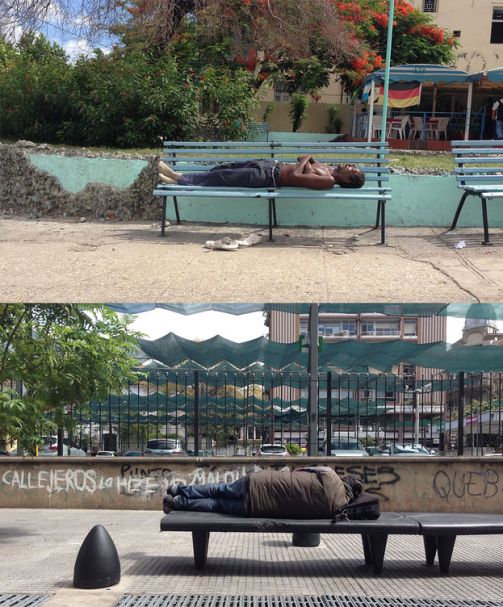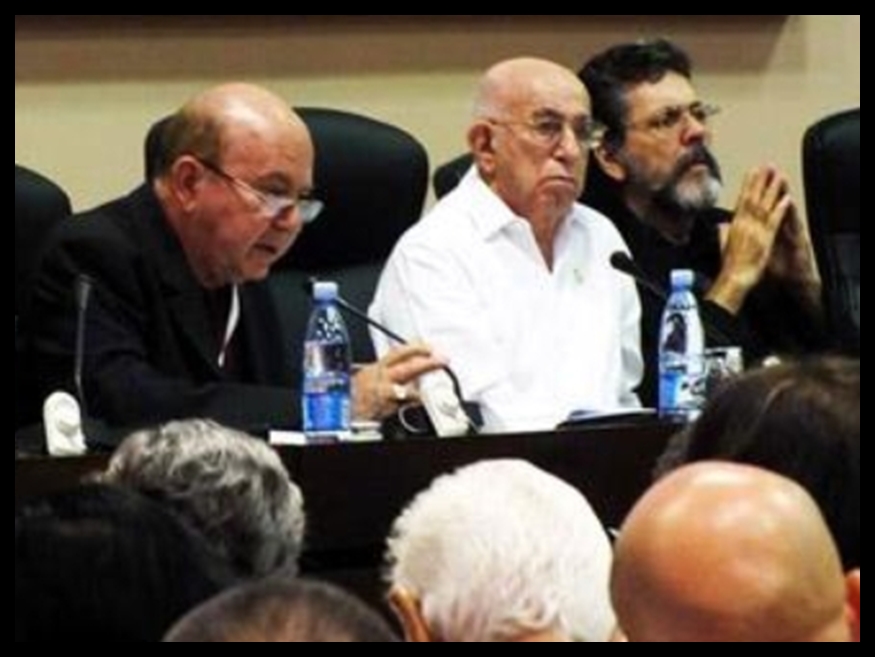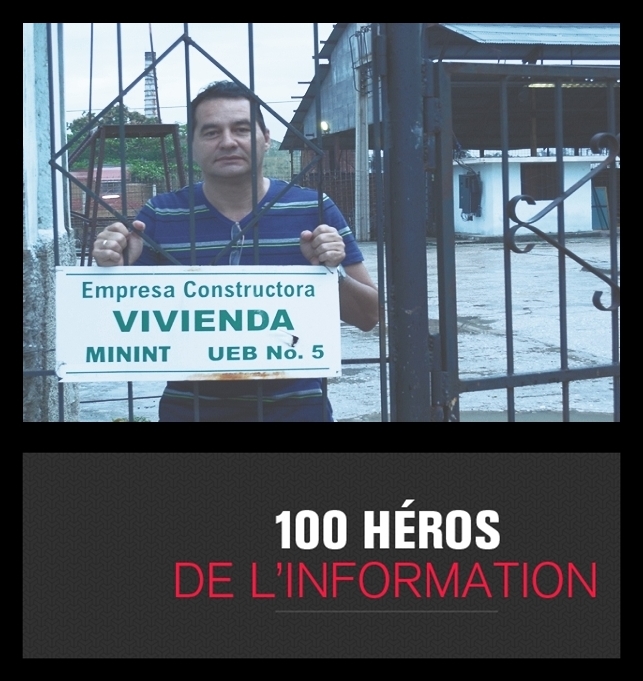Category: AUTHORS
“Cuba greatly appreciates foreign companies,” according to Tokmakjian / 14ymedio
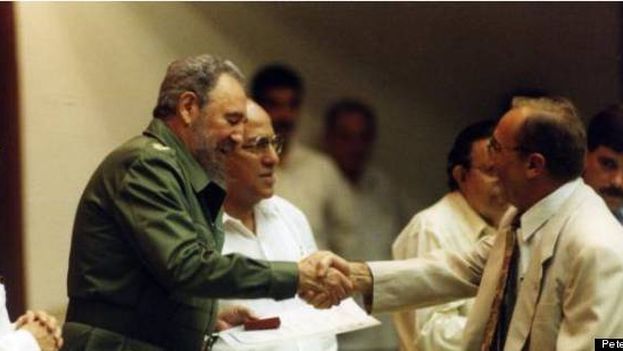
In 2010 the Canadian businessman stressed his full confidence in the Island’s authorities in an interview with Excelencias del Motor magazine.
14ymedio, Havana, 30 September 2014 — A year before his arrest in Havana in September 2011, for a host of crimes (bribery, fraud, trafficking in foreign currency, forgery, tax evasion, acts to the detriment of the national economy), the Canadian businessman Cy Tokmakjian, sentenced last week to 15 years in prison, made very positive statements about the business climate in Cuba.
In an interview published in January 2010 in Excelencias del Motor magazine, belonging to a Spanish group with representation on the Island, the owner of the Tokmakjian Group spoke of the success of his company and its projects after 21 years in Cuba.
At that time, the company was expanding with the opening of the technical facilities of Wajay (Havana), Camaguey and Moa (Holguin), which had helped increase the number of Cuban employees from 140 to 230 workers.
The Tokmakjian Group, according to its founder, intended to use Cuban specialists for trade with the rest of Latin America, especially Panama, Nicaragua, Costa Rica and the Dominican Republic. The businessman introduced high-tech equipment to manufacture products in Cuba, “to solve national problems quickly and export from this country,” through joint ventures.
“We have to maneuver carefully not to lose the investment, the support and the confidence we have in Cuba”
Cy Tokmakjian showed no fear, faced with the ravages of the global economic crisis. “I’ve been in Cuba 21 years, I know the current situation in the country. During the years 1991 and 1992, the situation was no better, we are ‘accustomed’ to working in difficult times,” he explained. “The parent company in Canada trusts Cuba and the Cubans, which allows flexible receipts and payments; we expect Cuba will recover; we will continue doing business. However, we have to maneuver carefully, not to lose the investment, the support and the confidence we have in Cuba. We are all working on this together, Canadians and Cubans,” he added.
“Cuba greatly appreciates the foreign companies that continue to work in Cuba through difficult times. Together, Cubans and Canadians, we maintain an ethic, a principle, and mutual assistance,” he revealed.
Michael H. Miranda: to (not) live in a foreign country / Luis Felipe Rojas
Michael Hernandez Miranda (Holguín, Cueto, 1974) has come from the Far West (College Station, Texas, where he prepared his doctoral thesis) to show us his first collection of poems written halfway between Cuba and the United States. In A Foreign Country (Silueta, 2014) is the forthcoming event for August 7 at the Spanish Cultural Center in “Sun City” (Miami, Florida).
Miranda is an editor of books written on the shores of the province, for years he worked for the publishing house of the Cuban town where he lived, and after some skirmishing to make an alternative promotion (Bifronte Magazine, 2005-2006), came to the United States , where he has collected a bunch of poems he brings wrapped in a country that does not seem very “foreign” to him.
More than a decade after the publication of his first poetry book, Old Lies of Another Class (2000), Silueta (Silhouette) Publisher presents In A Strange Country. It is a wide selection of texts where Michael opens a range of possibilities between the strength of the images raised in his daily readings, the fruits of his best talks and a pedigree of being an outcast, a man who never looks back. This book looks like a farewell book, but it is a book of new “beginnings”, such that one is drawn by a human being when he understands the other dimensions the world offers him.
“there is nothing in the world called man or woman / we have sought to the point of desperation for something beyond / ourselves. we still have silence. we still have loneliness as / a copper sword that multiplies.”
The best way to sink one’s mind into this “foreign country” is to read without thinking about the blogs of the generations to which so much damage has been done in recent years in Cuba. The island was scrapped between critics and strangers who tried to frame a photo that wasn’t. To read “Nothing I say or will say has the taste of water” doesn’t need a group mapping. Michael (Hache) Miranda has understood the distance of five years outside of the fictional wall of his other country. We are in the presence of a poet who puts the word above any perks. And Michael comes from a country where such a simple action costs dearly.
An editorial effort
This collection is among the last dozen books published by Silueta and the commendable work of Cubans who parked their literary work away from the false reflectors, beyond the commitment of applause. The publisher Silueta is marking the footprints of Cuban literature, and it does it going forward, opening a path … or its wings, so that others avoid the censorship of the country they have left. It is something that is appreciated in advance.
Miami has been branded “a literary desert” and place “of cubaneo,” references launched pejoratively. However, since 1959 outstanding Cuban intellectuals who fled the repression and censorship on the island have settled. Economists, essayist sand philologists have occupied important positions in educational institutions of the place such as Florida International University (FIU ) or Miami Dade College (MDC). In recent decades small publishers have been responsible for promoting and marketing the work of Cuban writers, scattered around the world. Along with Silueta there are Neo Club Editions and the Alexandria Library, among others.
In a quick reading it is understood that we are invited to a poetry without linguistic moorings: “naked I’ll be when you come to ask me again / where I come from. // and I will say: I have a word here / a word / one / hard to kill / a word / island / hard to kill / a word / shot in the head.// the island is a cardinal point in this fiesta.// to whom to I owe my two shores.”
Michael Hernandez is also the author of the poetry collections Las invenciones del dolor (2001) (The inventions of pain) and en óleos de james ensor (2003) (in paintings by james ensor). “His poems, narrations and articles appear in several anthologies, selections and publications in Spain, Mexico, Canada, the United States and Cuba, among other countries. He has lived in the United States since 2008,” says the catalog of the publisher who is publishing him today.
The poet lives in College Station, Texas, where he is writing a thesis on Cuban literature in exile. The presentation will be at 7:00 pm and will be led by prominent essayist and professor Joaquín Badajoz.
4 August 2014
A Letter to Cuba’s Bishops / Orlando Luis Pardo Lazo
His Excellency, Dionisio García Ibáñez
Archbishop of Santiago de Cuba and Cardinal Primate of Cuba
Your Excellency:
Last night I had the opportunity to meet you at a reception in your honor given by Archbishop Carlo Maria Viganò, the papal nuncio to Cuba. Today I am writing to you regarding several concerns of the Center for a Free Cuba with the hope that in your role as president of the Cuban Conference of Catholic Bishops you might forward this letter to your fellow bishops.
The Center for a Free Cuba is an independent organization that promotes respect for human rights and the re-establishment of a democratic government under the rule of law in our beloved Cuba.
The Center considers the evangelization and humanitarian work of the Church in Cuba to be of utmost importance and has always responded to the requests of priests and bishops who have approached us. In light of our strong desire to continue collaborating with the Church, please allow us to share with Your Excellency the following concerns:
1) It has been reported that there are over three thousand cases of dengue fever in Cienfuegos. What can you tell us about the causes of this epidemic and what steps are being taken to counter it? How can we support the Church to help those affected?
2) As of more than two years ago, two devout Cuban Catholics have been held prisoner without trial. They were arrested and beaten by State Security agents as they were preparing to attend the mass celebrated in Havana by Pope Benedict XVI in March of 2012. Sonia Garro is being held in the Manto Negro prison. She is not in good health. Her husband, Ramón Alejandro Muñoz, is being held in the Combinado del Este prison.
Could not the Church urge the authorities to release them, or at least to put them on trial? We would also greatly appreciate it if the bishops celebrated a mass on behalf of Sonia and Ramón and all other political prisoners, as Archbishop Wenski did recently in Miami.
3) It is well known that the regime has intensified its repression of peaceful opposition figures such as the Ladies in White. Could not the Catholic Bishops Conference of Cuba ask the authorities to cease acts of repudiation and the excesses of the Rapid Response Brigades for the sake of peace and national reconciliation? Is there anything that might be preventing this noble and urgent request?
4) In the [Church sponsored] periodical, Espacio Laical (Secular Space), there have been articles about the need to encourage a “loyal opposition.” Many ask, loyal to whom or to what? To the regime or to freedom, democracy and the full dignity of all human beings? Clarification of this issue would be helpful so that the publication or the Church is not seen to be branding as “disloyal” anyone not in agreement with those who for more than half a century have held the people of Cuba hostage.
Given our great respect for your high office, we would very much appreciate your comments on the concerns we have outlined in this letter.
In extending this cordial and patriotic message to Your Excellency, as well as to the other bishops of our forlorn homeland, we evoke the memory of the historic visit of His Holiness, St. John Paul II, who urged all of us to be “valiant in truth, bold in freedom, constant in responsibility, generous in love, invincible in hope.”
Respectfully yours,
On behalf of the Center for a Free Cuba
Guillermo Marmol, businessman and civic leader
Filiberto Agusti, Esq., attorney and legal counsel for the Center for a Free Cuba
Dr. Néstor Carbonell Cortina, businessman, intellectual and civic leader
Ellis E. Briggs, former United States ambassador to Portugal, Panama and Honduras
Beatriz Casals, businesswoman, intellectual and civic leader
Prof. Carlos Eire, Yale University
Dr. Sergio Díaz Briquets, international advisor
Prof. Jaime Suchlicki, University of Miami
José Sorzano, former United States ambassador to the United Nations
Prof. Enrico Mario Santí, University of Kentucky
Otto J. Reich, former United States ambassador to Venezuela
Joaquín P. Pujol, economist, former assistant director of the International Monetary Fund and member of the Association for the Study of the Cuban Economy
Victor J. Pujals, P.E., professional engineer and civic leader
Robert A. O’Brien, businessman, civic leader and philanthropist
Frank Calzon, executive director for the Center for a Free Cuba [frank.calzon@cubacenter.org]
Posted to this blog:
25 September 2014
Changes in Cuba / Angel Santiesteban
Could Havana be a “Wonder City”? / Luzbely Escobar
The number of foreigners living in Cuba has dropped dramatically / 14ymedio

14ymedio, Havana, 30 September 2014 – The National Statistics Office recorded a sharp drop in the number of foreign residents in Cuba, which in 2012 represented only 0.05 percent of the population. The figure is well below the 15 percent share of the foreign population based on the Island during the 1970s.
These data are included in the census conducted in 2012, which also points to a growing trend of population shift to Cuba’s cities, especially toward Havana. Of those who migrate internally in Cuba, 46.1 percent are men.
A note in the newspaper Granma notes that people who move to Havana Come primarily from the provinces of Holguín, Granma, Santiago de Cuba and Guantanamo. Proportionally Havana is also the province with the largest number of native residents who do not emigrate—followed by Mayabeque, Matanzas and Artemis, while Guantánamo keeps the smallest number of its natives followed by Pinar del Rio and Cienfuegos.
The search for better pay as well as better opportunities to improve one’s condition and for recreations were the main reasons that sparked internal migration.
Tiananmen Returns / Yoani Sanchez

14ymedio, Yoani Sanchez, Havana, 30 September 2014 – Memory can rarely be put to rest. Memories don’t understand permissions or authorizations, they return, period. For a quarter of a century the Chinese government has tried to erase the events of Tiananmen Square, but now the thousands of young people who are protesting on the streets of Hong Kong evoke them. It’s hard not to think of that man with the shopping bag stationed in front of tank, while looking at these people who demand the resignation of an official as servile to Beijing as he is unpopular.
Twenty-five years of trying to clean up the official history of what happened in that other social explosion that ended in the most brutal repression hasn’t accomplished much. Those streets full of peaceful but exhausted people show it. However, there are also great differences between the 1989 revolt in the Asian giant and the current demonstrations in their “special administrative region.” The fundamental change is that we are participants—from our televisions, digital newspapers and social networks—in every moment the people of Hong Kong are experiencing. The lack of information that surrounded the Tiananmen Square protests now has its counterpart in a barrage of tweets, photos and videos coming from thousands of mobile phones
For how many years will the Chinese government try to erase what is happening today? How will they strengthen the Great Firewall within the country so that people don’t know what is happening so close by? The violent repression of last Sunday only serves to add to the determination and the number of protestors in the streets of the ex-British colony. However, despite the multitudes and the numerous digital screens shining in the Hong Kong night, memory persists in taking us back to one man. An individual who was returning from the market and decided that the treads of a tank were not going to crush his remaining civility. Twenty-five years later, reality is echoing his gesture.
The Fragrance of Sacred Symbols / 14ymedio
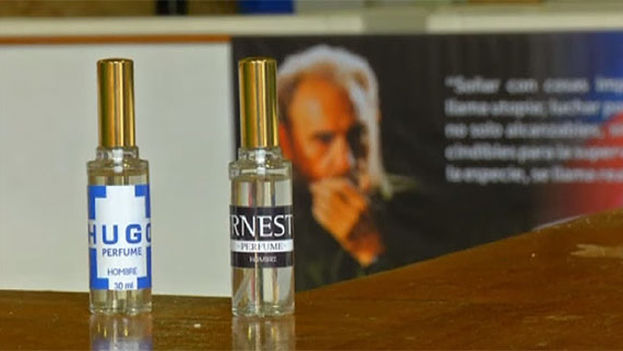
14ymedio, Havana, N. Mell – 29 September 2014 – Since an official statement published in the newspaper Granma last Saturday, rejecting the planned marketing by the Cuban company Labiofam of perfumes named after Ernest Guevara and Hugo Chavez, the controversy about who is really responsible for this “grave error” continues to animate conversations.
The omissions in the statement from the Council of Ministers are very significant. For example, there is no mention that this business group, responsible for the production of biopharmaceuticals and chemicals, is under the Ministry of Agriculture. Instead, it is treated as an organism of the central state administration. More surprising is the hiding of the fact that this isn’t the first time they have announced the creation of perfumes named after personalities connected to the Revolutionary epic.
Fidel and Raul Castro’s nephew has ruled the company with the same voluntarism that his uncles have ruled the island
Fidel and Raul Castro’s nephew has ruled the company with the same voluntarism that his uncles have ruled the island. There is nothing in the company that hasn’t been thought up, or at least approved, by him, including the weekly menu in the workers’ cafeteria. And, even though the company has fallen short of its planned performance for the last five years, it has been presented as a model institution of modern times and its hierarchy as untouchable beings.
It hasn’t been disclosed if the disciplinary measures announced by the Council of Ministers Executive Committee will seek a scapegoat to save the reputation of the CEO, or if the flames will reach the top of the pyramid. There are many threads behind the intrigue, each one pulling in a different direction.
The ideological and emotional argument that “symbols are sacred” convinces almost no one, especially in a country where the face of Che Guevara himself appears tarnishing the national flag in ashtrays where cigarettes are crushed to extinction. Maybe Labiofam believed that an independent company is governed more by the rules of marketing than by the designs of the Party, or maybe the time has come to end a feud over whose “remains” new interests already have their eyes on.
*Translator’s note: Fidel’s middle name is Alejandro
Former Deputy Minister of Sugar Sentenced to 20 Years in Prison for Corruption / 14ymedio

14ymedio, 29 September 2014 – Fourteen Cubans have been sentenced to between 6 and 20 years in prison in the corruption case known as “Tokmakjian.” Nelson Labrada, the Sugar deputy minister and Ernesto Gomex, former director of the state mining company Ferro, are among the group and have been sentenced to 20 years and 12 years in prison, respectively.
The case, which raised great concern among investors in Cuban businesses, tried several Cuban and foreign businessmen for the crimes of bribery, forgery of bank documents, fraud, trafficking in hard currency and tax evasion associated tih the Tokmakjian Group. The Canadian company had businesses in Cuba for for more than twenty years, particularly in sales of transportation equipment, mining and construction.
Last Saturday the conviction of Cy Tokmakjian, age 74 and founder of group, was sentenced to 15 years, of which he has already served three since his arrest. Claudio Vetere, company spokesperson, and Chief Financial Officer Marco Puche, were sentenced to 12 and 8 years in prison respectively. Cuba also seized about $ 100 million in company assets.
Street people / Reinaldo Escobar
In the two photos that I compare here I am not intending to insinuate that it’s the same in Buenos Aires as in Havana, because there will always be people sleeping on the street.
The Havanan (or maybe he is from another province) who sleeps shirtless in the full sun on the centrally-located Avenue of the Presidents at the corner of 23rd, in the heart of El Vedado, has left his shoes in reach of anyone who might steal them, figuring, perhaps, that there’s no one more poor than he. The pants he is wearing are tied with something that clearly isn’t a belt, and one could wager that he has ingested a goodly dose of alcohol. In the background, a reminder of the World Cup, the Argentine flag flies accompanied by one from Germany and another from Brazil.
The Argentine (probably an immigrant) protects himself from a slight chill with perhaps too many clothes and has something like a briefcase for a pillow. His image could illustrate the drama of many unemployed, people who have seen their lives shattered with the latest crisis. Behind him are more or less luxurious cars, contrasting with his misery. On the walls are the libertarian slogans of some graffiti artists that nobody has bothered to paint over. The street looks clean and everyone who passes by ignores him.
If they are sleeping they are dreaming of different, but equally unattainable, things.
28 September 2014
The High Cost of the Five / Fernando Damaso
The trial in which the five Cuban spies were found guilty and sentenced to prison — a place where they enjoy internet access, regular phone calls, the means to entertain themselves (painting supplies, tools for writing poetry, etc.), sanitary living conditions, comfortable jail cells, medical care, nutritious food, gym facilities, a wardrobe and other comforts — has cost and continues to cost the American taxpayer a tidy sum of money.
However, it has undoubtedly cost the Cuban people even more. We are the ones paying the high salaries of their lawyers. Through our embassies overseas we pay to support the various solidarity groups seeking their release, the members of which are also invited as political tourists on all-expense-paid visits to Cuba.
As though that were not enough, there are also the round-trip airline tickets for all their extended family members, who routinely visit them in prison and proselytize on their behalf. There are also the costs associated with providing these family members with wardrobes, spending money, food and lodging. Add to this the expenses for the spies who have already been released and who now serve as international spokespersons.
There is the ongoing expense of demonstrations of support in Cuban schools, factories and businesses. There are the marches, rallies and concerts in their honor, the art exhibitions, the books dedicated to them, and many other such commemorations.
Considering all the people held in detention, it is fortunate that only these five — members of the so-called Wasp Network — have agreed to become heroes by decree. Otherwise, the costs for both the American and Cuban taxpayer would be exponentially greater.
25 September 2014
“J’Accuse” from a High Position / 14ymedio
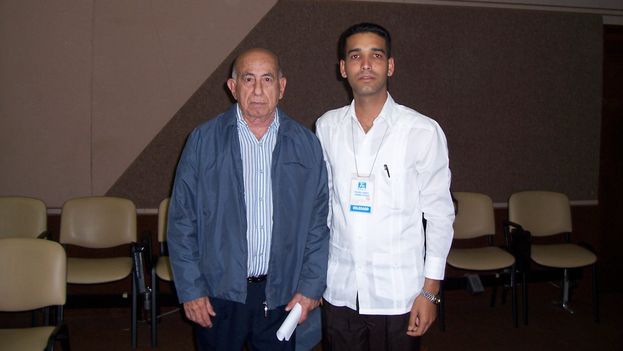
An official with the Housing Institute denounces corruption and privileges, as well as reprisals taken against his family.
14ymedio, September 24, 2014 – Before leaving Cuba in October, 2013, the author of this accusation occupied an important post at the Housing Institute and, as a jurist, saw firsthand the intrigues perpetrated by high-level officers of the agency to illegally grant properties to elites and friends. As is shown in the accompanying photos, Juan Carlos Gálvez Migueles was an active participant in the political life of the Island. On December 14, 2008, Gálvez was elected to the national secretariat of the Committees for the Defense of the Revolution, and ratified as a member of the executive committee of that organization.
A lawyer by profession, Gálvez worked as a counterintelligence officer following his studies at the Eliseo Reyes Rodríguez “Capitán San Luis” Advanced Institute of the Interior Ministry. His problems started when he refused to collaborate in the legalization of mansions belonging to the children of ex-President Fidel Castro.
“I was disappointed in many things about the system that were drummed into me and that I was taught to defend. The blindfold fell from my eyes when I saw the problems of daily life in the real world of the average Cuban,” Gálvez told 14ymedio in an email exchange. “That system is not made for honest, sincere, hardworking people like me, where the more corrupt one is, the better.”
My Duty is to Denounce – I Am Not Afraid
by: Juan Carlos Gálvez Migueles
By these presents I wish to make a public statement about the violation being committed by officials of the Cuban State who represent the Provincial Housing Administration of Havana, against three women and a girl of just one year of age, with the intent of evicting them from the property located on 3rd Street, Building 15022, Apt. 10, between 7th and N streets, Altahabana neighborhood, Boyeros municipality. These women are: Sara Elvira Migueles Velo, 47-years-old; Rosaima Rodríguez Migueles, 17-years-old; Marinelvis Martínez Migueles, 24-year-old, mother of a one-year-old girl, named Aynoa. They are, respectively, my mother, sisters and niece.
The property from which the authorities want to remove them was acquired by this writer in May, 2012, when I was appointed Principal Specialist of the Havana Provincial Housing legal division, while in process of being named assistant legal director of this agency.
In August of 2013, I was accepted to participate in an advanced public administration course at the University of Extremadura, Spain. However, the Spanish embassy did not grant me a visa because I missed the deadline to submit some required original documents. At that point I decided to leave Cuba for good, due to various reasons that at present I don’t believe it opportune to divulge.
To facilitate my departure I took advantage of the opportunity provided by this course and requested authorizaton by the Provincial Housing Director, Liudmila Mejias Ocaña, to approve my attending this course. In reality, I was leaving for another country but I could not say where I was going, because right away my family’s home would be taken away, as is happening right now. Besides, I also could not disclose what I was up to, because I had been a member of the Interior Ministry and had ties to high-level officials stemming from the duties I carried out.
In October, 2013, I left Cuba, keeping my new home base a secret, until January, 2014, when it becomes known. It was then, in a gesture of cruelty and bad faith, that the Provincial Director of Housing and Assistant Legal Director, Marbelis Velázquez Reyes, imposed a disciplinary measure on me of final separation from the agency for unjustified absences. This is a measure that violates Decree 302 of October 11, 2012, which in turn modifies Law No. 1312, “Migration,” of September 20, 1976, given that what should have been applied in my case was a leave of absence from my position.
But her objective was to take revenge because I had already been selected as assistant provincial legal director. Therefore, she had to attack my family, declaring them illegal occupants without right to relocation, knowing that they had no place of origin. Then, where will they be taken to live? On the street, to a temporary community shelter? I don’t believe this is just or honorable.
Therefore, I am bound to make this accusation:
I was asked to work on the legalization of the houses owned by the children of ex-President Fidel Castro Ruz, all homes that consisted of more than 500 square meters of living space, comprising more than 1000 meters of total lot space, surrounded by hundreds of meters of addition land. I refused to do this, based on it being in violation of the current General Housing Law No. 65, which only recognizes properties up to 800 meters in size.
I was asked to work on the legalization of the houses owned by the children of ex-President Fidel Castro Ruz, all homes that consisted of more than 500 square meters of living space.
These individuals, by virtue of being offspring of a leader, have more rights to a good home than my family. I ask: What do they contribute to society that I haven’t? In what war did they serve? What have they done that is special? Why do these citizens have to have an interior ministry official representing them in their legalization proceedings?
Are they different from other Cubans? Can they not go to the municipal housing administration like other citizens? Could it be that they cannot wait in line? Can they not observe the waiting period established by law? Are they subject to a different law that I was not taught at the Advanced Institute of the Interior Ministry, when I was pursuing my degree in law and operative investigation of counterintelligence? Where is the equality that we so proclaim to the world?
Another case is that of Marino Murillo Jorge, vice-president of the Council of Ministers, to whom was granted a grand residence – or rather, a mansion in the Playa district, in return for an apartment he owned in Cerro municipality. But the irony is that the property Murillo was granted was assigned to the Ministry of Education and, with supposedly just the authorization of Raúl Castro Ruz, it was transferred to the ownership of this citizen without any disentailment process and, hence, no discussion.
Perhaps this citizen, for occupying a high post in the Cuban government, has more right to a dignified home than my family? What merits does he have that hundreds of thousands of Cubans, as educated as he or more so, do not?
I can also speak to the favors granted to officials of the National Housing Institute such as the house that was exchanged for the president of this agency, Oris Silvia Fernández Hernández, a grand property, which originated in a confiscation. Could it be that she has more rights than my family? Does the legal director of the National Housing Institute also have more rights than my family, a corrupt individual who has been sanctioned and yet remains in his post? I could go on naming any number of high State officials.
The granting of housing is decided in the office of the Provincial Director in favor of individuals who pay up to 5000 CUCs.
I denounce how thousands of families live in unhealthy conditions in temporary community shelters. They are not granted public housing, this being a responsibility of the Provincial Housing Director, Liudmila Mejías Ocaña, who does not control the administration of the Provincial Housing Commission. The granting of housing is decided in the office of the Provincial Director in favor of individuals who pay up to 5000 CUCs, friends who give gifts, as well as high-level officials, and relatives and lovers of high-level officials. All of this is public knowledge and has been condemned on various occasions but, as there is so much intrigue that involves high-level officials, nothing happens.
I denounce how legal documents are worked up in the Provincial Housing Office to favor these same people, all under the Thirteenth Special Ruling on Law No. 65 (General Housing Law), being concluded in record time, while the documents in other cases go to eternal rest. Those responsible are the Provincial Director, and the Assistant Legal Director, Marbelis Velazquez Reyes. The latter owns a fine house that was disentailed to her after seven years, very well furnished and equipped, while she earns a monthly salary of only 500 Cuban pesos.
I denounce how my family, on September 17, asked to be seen at the Council of State of the Republic of Cuba to present their case and were refused attention, the officials alleging that only letters are accepted at that location and nobody is seen in-person – an unheard-of and ill-intentioned assertion. This is not the democracy promised by our rule of law.
In similar fashion, they went before the Provincial Party Committee of Havana and the officials who saw them during a public hearing told them to go before the Municipal Administrative Council of Boyeros and, if their problem was not resolved there, they should go before the Provincial Administrative Council of Havana. As we would say in Cuban, it was a ball game, back and forth.
I should ask, why not lease the property to my family? For whom is this property being reserved? It could be that this apartment is already sold, or is being set aside for a friend.
Surely when this accusation comes to light, they will begin to question me about where I obtained the money to leave Cuba. Well, it was from the sale of the deplorable house that my mother owned and a landline telephone that I had in my name, money that I supplemented with funds from a friend who was my older sister’s boyfriend.
I ask that the right of my family to live in a decent home be respected, that events will not be repeated like those we endured when for more than 10 years we lived in a wooden building that was falling apart, where we would bathe in the kitchen, and defecate in nylon bags because we had no toilet. At that time I was a delegate to the Municipal Assembly of Popular Power of San Nicolás de Bari, today Mayabeque province.
My neighbors there and those who voted me in can attest to this. That was also the time that I served as Municipal Housing Director and never did I take even one concrete block for my house – a fact that my employees can corroborate. What did I gain from being so humble, so honest, that now my family should be treated in this manner. For all of this I decided to leave my homeland.
I declare that today I fear for the lives of my family in Cuba, for possible reprisals against them, resulting from this accusation and others that I may be forced to make to defend our rights. By the same token I fear for my life in this country where I reside, for having information about officials, for having been myself a member of the Cuban counterintelligence and someone who knows the methods they employ.
Translated by Alicia Barraqué Ellison
Hey, “Mamá Iné”!… Are We Out of Coffee Too? / Miriam Celaya
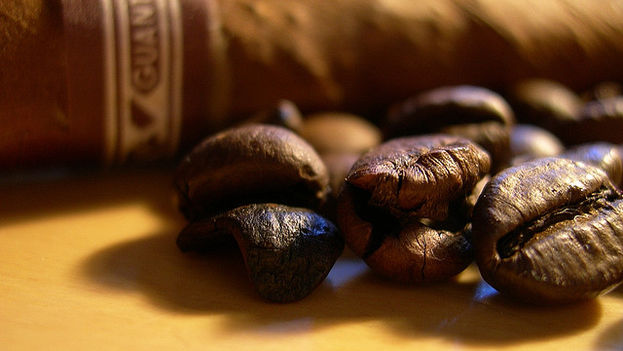
14ymedio, Havana, Miriam Celaya, 5 September 2014 — On Wednesday September 3rd, the official press conveyed another grim announcement to the Cuban people. Granma wrote: “The coffee harvest, newly launched in the province of Guantánamo, in eastern-most Cuba, will be ‘small’, with a decrease of 33% compared to the previous year.” The news adds to what appears to be the new information strategy (Raul-style “transparency”?) consisting in offering on newscasts on radio and TV, and in newspapers, a trickling of notes, articles and reports that show some negative figures on the Cuban economy, conveniently interspersed with other usual triumphalist breath. As a common denominator, such reports also bring proposals for typical solutions: calls for efficiency and “systematic actions” to ensure increased productivity to compensate for the economic debacle that is about to hit.
Thus, this crop will produce 342 fewer tons of coffee despite the installation of “another seven ecological pulp-extracting facilities” that will increase industrial performance to “reach 4.02 pounds per each can that will benefit”, superior to the previous coffee harvest figure. And, though we have not experienced severe weather to justify the lower production, and though they do not offer details about possible causes for the decreased harvest, everything is a prelude to coffee –as the sugar crop in previous years – is another traditional economic line in Cuba headed for extinction.
The Birth of a Tradition
Coffee is an essential component of our national culture, strongly rooted in our consumption and traditional customs, both at the family and at the social level since its introduction in Cuba in the late 18th century by French planters fleeing from the rebellion of slaves in the neighboring island of Haiti. continue reading
In the early 19th century, wealthy Cuban coffee plantations flourished, especially in the southeastern part, contributing since then to the economic wealth and to the development of another form of agricultural technology in the country which became cemented definitively in the 20th century, when coffee production reached its highest standards of quality and quantity.
There were no neighborhood stores without the typical aroma stemming from coffee grinders.
With the coffee boom and the reduction in prices, consumption of the aromatic infusion among the Cuban population increased, including among the poorest levels, replacing cocoa in popular consumption.
A recognition of the importance of this agricultural branch in the history and cultural identity of the country was the recording of the Archaeological Landscape of the First Coffee Plantations in Cuba’s Southeast as a World Heritage Site in 2000, based on the specifics of a tradition whose first material tracks, which are still preserved, constitute “a unique example of pioneer form of agriculture” and “substantially illuminate the technological, economic and social history of the Caribbean and Latin America” (Proceedings of the UNESCO World Heritage).
In recent decades, coffee, like all domestic products, has been marked by the rapid economic decline and decay that is affecting the entire Cuban economy. The causes are the same as the ones that ruined the sugar industry and the rest of the national socio-economic life: political voluntarism and extreme centralization of a totally unproductive and inefficient system.
The disaster has been gradual but steady, and it’s reflected in the practice of coffee consumption and contamination of the product, with additions to stretch it and cover at least the meager allowance of 115 grams (4 ounces) as the monthly ration, a 50-50 mixture of the lowest quality coffee and green peas. The palates of millions of Cubans have been corrupted with the resulting brew, to the point that many do not know or have forgotten the true taste and aroma of the fragrant bean.
But Cuban coffee made its mark not only on tangible items such as production and consumption, but it also etched and enriched our national spiritual life via the most unlikely and varied artists and performers. Thus, the green coffee plantations became an integral part of the Cuban rural landscape, while in urban spaces coffee shops proliferated, and there wasn’t a neighborhood store without the typical aroma from the coffee grinders.
Poetry too, painting, and even music were inspired by coffee in some of the best known works of Cuban art. Suffice it to remember the retro song that the unforgettable Rita Montaner made popular in the first half of the last century, with that refrain that became perpetuated in our popular folklore: “Ay, Mamma Inez, Ay, Mamma Inez, all of us negroes drink coffee,” flatly denying that principle that was both fallacious and racist that once called the infusion “the black nectar of the white gods”.
Cuban coffee today
Today, coffee has become scarce even on the shelves of stores operating in “convertible pesos” (CUC), in spite of imports of beans marketed by French or Spanish companies and by Vietnam, which became a coffee producer with the assistance of Cuban experts.
Today, coffee agricultural tradition is dying in Cuba. Perhaps it is fortunate that UNESCO has recorded the ruins of our nineteenth-century coffee plantations in the list of World Heritage sites. It may be that, after the passing of the olive green plague, this will be the only vestige left of what once was one of the finest.
Translated by Norma Whiting
The “Hero” Who Couldn’t Find the Entrance / Angel Santiesteban
A great truth was revealed at the VIII Conference of the National Union of Writers and Artists of Cuba (UNEAC, by its Spanish initials).
We have to admit when our detractors speak the truth. There’s no other option than –for the sake of honesty– to accept how right they’ve been. Therefore, I have to admit that, yes, “The UNEAC is the Moncada of culture”*. It’s impossible to state it any clearer, for we know well the political, human, logistic, and leadership failures that the assault on the Moncada Barracks in 1953 symbolized, when the immature and terribly suspicious Fidel Castro stationed a select group to practice their aim in Santiago de Cuba. With neither suitable arms nor adequate preparations to confront the army, he sent them to a certain death.
How can intellectuals pretend not to recognize Fidel Castro’s cowardice, who — in spite of having gone to school in that city and having planned the attack — couldn’t find the entrance to the barracks, when those who had never been there were able to get behind its walls?
It is infuriating to watch that documentary where Fidel Castro, leaning on a car of that era, explains how he was unable to find the entrance, yet the cars traveling ahead and behind him managed to penetrate the garrison, whose entrance is of such a size that a blind man could find it! But we already know that there’s nothing worse than one who doesn’t want to see what’s in front of him.
That wasn’t his only mistake. We know that, throughout the entire struggle of the Rebel Army, he never participated in a single battle; and he advised Raul Castro to do likewise: while leading his comrades in the midst of combat, the latter would abandon the fight only to appear days later when the town square had been taken. Fidel Castro not only couldn’t find the entrance, he was unable to follow the sounds of gunfire on that fateful morning, nor could he redirect himself towards other posts during the shootout. On the contrary, he remained huddled, waiting for the end, and when he learned his soldiers were dead or captured, he sought shelter in a hole in order to finally turn himself in to the Catholic Church (which he never thanked for saving him), and reemerge as the hero.
Certainly, seen as a failure (the only way to comprehend this event), without a doubt, as the president of the UNEAC, Miguel Barnet, put it: “The UNEAC is the Moncada of culture”. He’s never been more right.
Angel Santiesteban-Prats
Lawton Prison Compound. April, 2014
* Santiesteban is referring to the speech by Miguel Barnet at the opening of the VIII UNEAC Conference.
Translated by: Yoyi el Monaguillo
Sign the petition so that Amnesty International will declare the Cuban dissident Ángel Santiesteban a prisoner of conscience.

